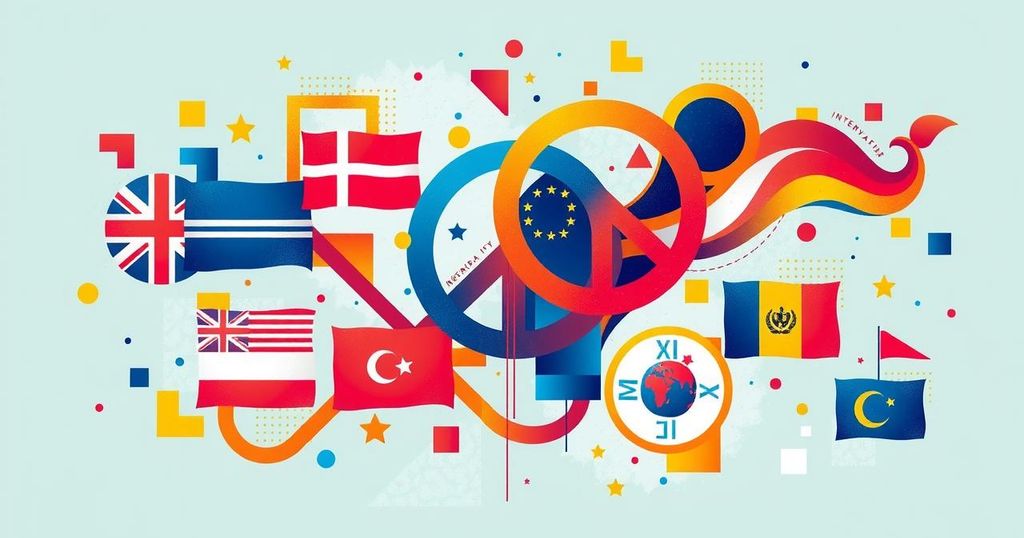Trump and Rubio Secure Rwanda-Congo Peace Treaty Amid Pakistan’s Nobel Prize Nomination

President Trump has announced a peace treaty between Rwanda and Congo, signaling a major diplomatic achievement. Concurrently, he has been nominated for the 2026 Nobel Peace Prize by Pakistan for his role in recent regional crises. However, India disputes his claims of mediating peace between the two nations. The unfolding situation presents complexities in international relations, particularly with differing narratives emerging from involved countries.
In a flashy announcement on Friday, President Donald Trump expressed delight about securing a treaty between Rwanda and the Democratic Republic of Congo, a conflict known for its extensive violence. He made this declaration via Truth Social, emphasizing the significance of this treaty in bringing some peace to a long-standing war. Trump stated that representatives from both countries will sign the documents in Washington on Monday, raising expectations around the agreement’s implications.
Amidst the excitement, Trump also mentioned that he has been nominated for the 2026 Nobel Peace Prize by the Government of Pakistan. He acknowledged the nomination but quickly pivoted to express skepticism about his chances of winning, stating emphatically that he would not receive the prestigious award regardless of his efforts. “This is a great day for Africa and, quite frankly, a great day for the world,” remarked Trump, underscoring his view of the treaty as a step toward global improvement. Yet, his tone became somewhat self-deprecating, claiming that achievements like facilitating peace in the India-Pakistan conflict or the Abraham Accords in the Middle East would go unrecognized.
The Nobel Peace Prize discussion came shortly after Pakistan publicly recommended Trump for the accolade in a post on social media platform X. The government praised him for his diplomatic intervention during the recent crisis between India and Pakistan, indicating that Trump’s actions had been pivotal in negotiating a ceasefire. They emphasized how his leadership helped alleviate regional tensions and called him a genuine peacemaker.
However, not everyone is in agreement with Trump’s narrative, especially India. On Wednesday, Indian officials clarified that their own negotiations for de-escalation during the military standoff happened directly with Pakistan. Indian Foreign Secretary Vikram Misri underscored that there had been no mediation from Trump, reaffirming India’s stance on direct dialogue without third-party involvement. Prime Minister Narendra Modi echoed this sentiment, stressing that India has maintained a consistent policy against mediation.
As the narrative around the Nobel nomination developed, the stakes appeared to rise, particularly against the backdrop of ongoing global issues. In their announcement, Pakistani leaders emphasized Trump’s diplomatic skills in conflict resolution and expressed hope that these actions would contribute to regional stability amid crises in other areas like the Middle East. They assessed that Trump’s leadership during the recent crisis reflects a broader legacy of effective diplomacy that resonates deeply in these turbulent times.
Moreover, to be nominated for the Nobel Peace Prize, candidates must come from qualified nominators, which includes heads of state and other prominent figures. The nomination process is confidential and extends until the end of January, paving the way for the 2026 award.
Amid contrasting views, the situation presents a complex picture of international diplomacy, where several leaders assess the significance and impact of this treaty, Trump’s nomination, and the ensuing political maneuvering. As events unfold, both supporters and critics will be looking closely to see what concrete results follow this high-profile announcement.
In summary, President Trump’s announcement concerning a major peace treaty between Rwanda and Congo highlights potential diplomatic gains while casting a spotlight on his Nobel Peace Prize nomination from Pakistan. Despite skepticism regarding his award chances, the nomination reflects global dynamics at play in international relations. Controversy, particularly from India’s side, complicates the narrative instead of solidifying a unanimously positive reception. As the situation continues to evolve, the significance of these diplomatic efforts remains to be fully realized and understood.
Original Source: www.foxnews.com








